What Is ERP (Enterprise Resource Planning)?
This article describes all you need to know about ERP and how to build your own customizable Enterprise resource planning - ERP using no code.

Are you looking to create an ERP enterprise resource planning software for your company using no code? Or just the ultimate guide to many ERP systems? If YES, this article is for you. An ERP software - enterprise resource planning software can be great for your company regardless of its size. It serves as customized resource planning - ERP applications that fulfill all your business needs. It consolidates an enterprise's knowledge and data database, automates daily assignments, and facilitates corporation strategies. The ultimate purpose of using Enterprise resource operations - ERP software is to optimize and simplify procedures, manage time for employee-related duties or jobs, and make them more productive. These pursuits can direct revenue growth and efficiencies while enhancing contact across the organization.
What is an ERP system?
ERP systems - Enterprise Resource Planning software solutions or ERP systems used by businesses to coordinate and manage the daily activities automatically of their operations. Early ERP systems were responsible for business functions like manufacturing, finance, accounts, project management, customer relationship management, supply chain management, and others. Now the new ERP systems are the ultimate software solutions program that is essential to businesses because they enable them to automate the duties of individuals, like risk management, customer relationship management, resource planning, budgeting, forecasting, and reporting by integrating all the operations required to manage with a single system.
In addition, a software solutions system for ERP software - Enterprise Resource Planning software can also incorporate planning, human resources, inventory buying, sales, marketing, finance, and other functions. ERP software plays a vital role in predicting the accurate analysis of a business's financial health and business processes.
What does ERP do?
With Enterprise Resource Planning - ERP software, you can easily communicate and share information with different departments and the entire organization. Enterprise Resource Planning - ERP applications gather information about the activity and various departments and make it available for the other relevant departments of the company where that information is needed.
You can connect the company's different departments, such as human resources, accounts, production, and distribution, together by using ERP implementation. Because various departments use other technologies but Enterprise Resource Planning - ERP software can terminate ill-matched ERP solutions, ERP modules technology, supply chain, and costly duplicates. Business processes often integrate order management, accounts payable, production management, delivery, order-tracking systems, and customer relationship management databases into one system.
Whether a small business or a big one, Enterprise Resource Planning - ERP solutions and ERP modules tailor the operations, costs, and human resources and allow you to expand your small business ERP implementations. You can use an Enterprise Resource Planning - ERP system in any of the following industries:
- Retail
- Healthcare
- Manufacturing
- Pharmaceutical
- Distribution
- Technology
- Construction
- Aerospace
How does It work?
Enterprise Resource Planning software / ERP systems enhance company efficiency by managing company human resources. Enterprise Resource Planning software / ERP solutions don't focus only on reducing the number of human resources necessary. Still, it ensures quality and business performance are not compromised, which are the elements of effective small business ERP software-related growth and profitability.
Enterprise resource planning uses an established standardized real-time data format - many ERP systems to function. Information travels from the one department that entered the real-time data and is immediately available to the other departments of the business performance that need that information. You have every department on the same page with this uniform structure. For example, a local food delivery company dealing with several locations to deliver food, managing other staff to convey the exact locations, orders and timing. Enterprise Resource Planning - ERP systems allow you to format all details in an organized way to travel the information to the authorized department from order placement to accounts and then to the delivery department.
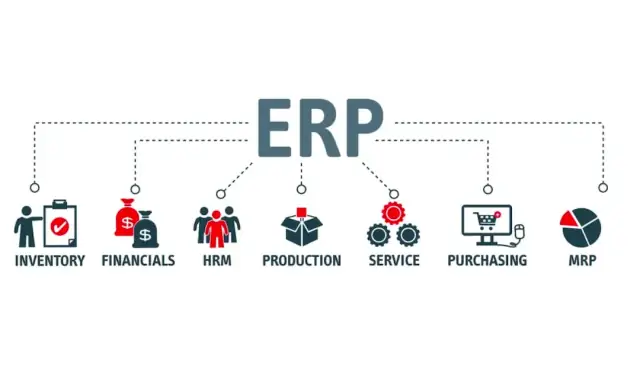
Benefits of ERP
There are several benefits of Enterprise Resource Planning providing ERP solutions and ERP modules that are impossible to ignore and their impact on today's business world.
-
Increase productivity
Improves productivity by automating small business ERP solutions and ERP modules that will enhance accuracy by eliminating unnecessary tasks. In addition, interconnecting departments can synchronize work to achieve better and quick results.
-
Reduce risk
An accurate prediction can prevent risk management, such as financial controls. For example, What will be the situation of the economy in the upcoming time, and what other factors will determine it?
-
Improves reporting
Businesses with fast reporting systems can benefit from accurate planning, budgeting, and forecasting. Plus, communicating with employees in times of need and interested parties, such as shareholders.
-
Lower operational cost
Enterprise Resource Planning: ERP systems and ERP modules eliminate the need for different departments to work individually and instead integrate their business functions into a single automated system. Information can be exchanged across to entire organization with this system, no matter how big or small the business. That means you can:
- Work more without using more human resources
- Will consume less time
- Fewer people needed
Ultimately, that reduces operational costs and helps you grow your business.
- Increase efficiency Enterprise Resource Planning: ERP systems allow businesses to act quickly to collect necessary information for clients, business partners, and retailers. You can improve employee and customer satisfaction and rapid response rates with this. As this, your essential business functions can operate efficiently, and it will associate with decreasing costs.
- Simpler IT Enterprise Resource Planning: ERP software system is a simple solution for everyone who shares a database; everyone can efficiently work from any place and anytime.
Types of ERP systems
There are three basic categories of Enterprise Resource Planning - ERP systems, each of which has a selection of deployment models. The three most popular types of Enterprise Resource Planning - ERP systems are hybrid ERP, on-premise ERP, and cloud-based ERP software.
Hybrid ERP
Enterprise Resource Planning: ERP software system combining on-premises and cloud-based ERP software deployment is called "hybrid" software. Each provider has a different hosting and deployment service combination. These models can give Hybrid ERP solution users the freedom to switch between delivery models or incorporate advantages not present in the current artificial intelligence system.
The combination of on-premise and cloud ERP implementation / Enterprise Resource Planning makes the hybrid ERP software / Enterprise Resource Planning approach available for businesses to fit their business needs. It is also known as Two-tier or hybrid ERP software. This software and data may be partially in cloud computing and partially on-premises at this point.
On-premise ERP
On-premise Enterprise Resource Planning: ERP implementation is a traditional model for hosting on the company's computers and servers. You can download this software on your real-time data center, and it could be any location of your choice. Once you establish the cloud ERP implementation, you have full control of the entire artificial intelligence system's complete management, support, and ownership. Your personnel is in charge of installing and maintaining the hardware and software. It can be updated and retained on the company computer and server in your physical workplace.
Cloud-based ERP
Cloud ERP: Enterprise Resource Planning is a web-based solution called software as a Service ( SaaS), currently the most preferred deployment strategy. Cloud ERP is connected to the Internet as a service that you subscribe to with cloud ERP, which is hosted in the cloud. It enables a business to access and save accurate time data on any device with an internet connection, typically by paying a fee. Cloud ERP needs the program supplier on your behalf and often handles regular maintenance, security, support, updates, and flexible customization. Cloud ERP - Enterprise Resource Planning is gaining popularity for various reasons. Cloud ERP includes lower initial costs, increased scalability, more straightforward integration, and many others.
What is the difference between CRM and ERP?
If we see it as a big picture, Enterprise Resource Planning - ERP and Content Resource Management - CRM work to increase profitability. Still, they both use different approaches to achieve the goal of profitability. The entire organization will eventually rely on Enterprise Resource Planning - ERP and Content Resource Management - CRM systems. The main difference between the two is that Content Resource Management - CRM is utilized by sales and customer relationship management, whereas Enterprise Resource Planning - ERP is mainly for financial, real-time data, and the finance department. Simply put, a Content Resource Management - CRM's motive is to produce a higher volume of sales and increase profits by improving customer relations. At the same time, An ERP's main motive is to automate the system, cut costs, and reduce overheads. With this, business becomes more efficient and minimizes the cost of capital spent on the process.
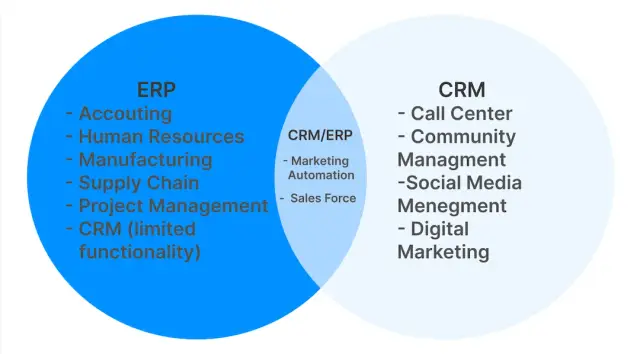
CRM features
- Automate sales force
- Marketing automation
- Customer relationship management
- Data reports creation
- Manage business contacts
- Manage business processes
- Analyze best-selling products
- Tracking the leads come from
- Sharing customer profiles with co-workers
- Managing inventory based on sales history
- Converting leads to closing deals
- Collaboration with others to sell
ERP features
- Production management
- Order management
- Project management
- Supply chain management
- Human resource management
- Inventory management
- Reduce unnecessary tasks
- Financial management
- Core business processes
- Procurement
- Lower purchasing costs
- Payroll
What is an example of an ERP system?
Many well-known companies are using popular ERP vendor and their Enterprise Resource Planning - ERP systems to double their profitability and run smoothly with time. Such as Amazon, Toyota, and Starbucks. Before we learn about their Enterprise Resource Planning - ERP systems, we must throw light on the advantages and disadvantages of Enterprise Resource Planning - ERP systems work to check how they are suitable for a business supply chain.
Advantages of custom-based ERP software
-
Flexibility
The third part is allowed to have specific features in their software. You can include only necessary and proper features in the system and not include the others, which can cause chaos and load the system.
-
Required features
It is possible to add specific and several features not just in the system but in the department too. For example, if you need tracking features in the order management department, you can have them without difficulty. Likewise, you can exclude many other Enterprise Resource Planning - ERP tools have features.
Disadvantages of custom-based ERP software
-
Expensive
It is hard to calculate the actual cost of Enterprise Resource Planning - ERP software because it depends on the project management, size, complexity, number of users, layout, and features. But considering the standard project cost can be huge because it needs to buy multiple software and labor costs.
-
Development time
ERP systems are a time taking core business process because it covers the whole department, features, and employees' real-time data into it. So you can take any ERP vendor or build your own ERP. It takes a lot of time to develop an Enterprise Resource Planning - ERP system to cover your whole business processes and supply chain.
Amazon
Amazon uses SAP (Systems Analysis and Program Development) to manage:
- Logistical business processes needs
- Finances
- Human resources
- Inventory management
- Order management
- Sales
- Supply chain
- Shipment
- Tracking
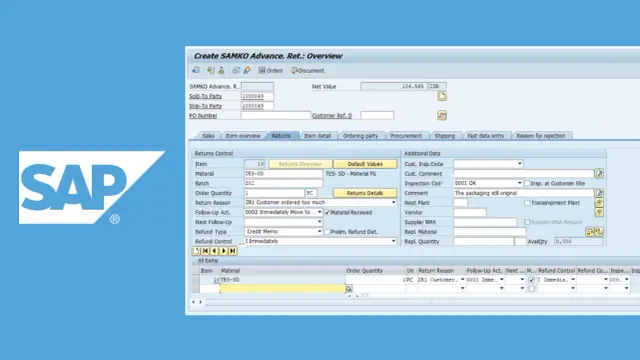
Users can manage all the above department functions using a single database. It allows us to handle orders around the country and track third-party aspects such as order fulfillment, cancelation, etc.
Toyota
When Toyota wanted to expand its business supply chain globally, it adopted the Enterprise Resource Planning - ERP systems of Microsoft Dynamics 365 to become a paperless business and supply chain. With this, Toyota reduced work hours and enhanced operation management accuracy and overall efficiency.
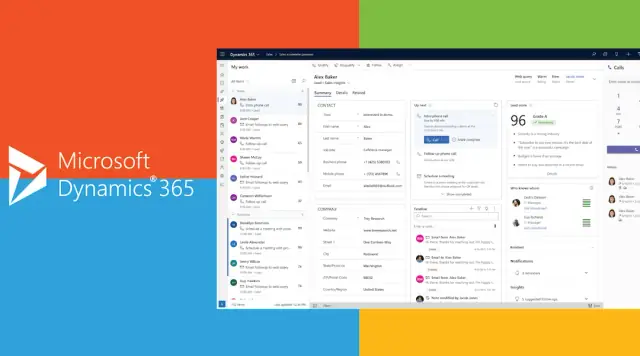
Plus, Toyota introduced after-sales services to its customers all over the world. With this ERP software / Enterprise Resource Planning software, Toyota won customers' hearts, becoming more loyal and resulting in sales.
Starbucks
Starbucks uses cloud-based ERP software / Enterprise Resource Planning software called Oracle ERP to automate daily business activities and supply chains. With this business management software, you can handle the following:
- Financial management
- Project management
- Supply chain management
- Procurement
- Accounting software
With this Oracle ERP, you can also see the critical information and revenue analysis in a database such as
- Expenses
- Revenue
- Sales data
- Operations updates
- Inventory management
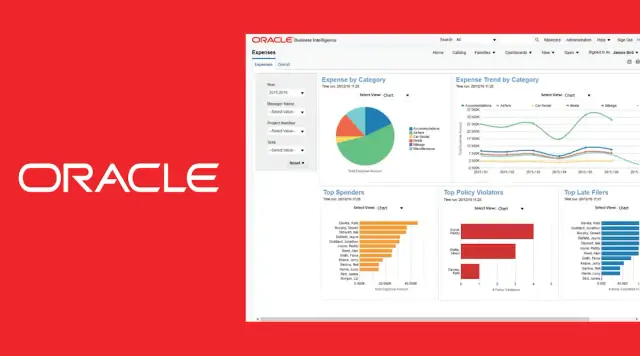
When you open Oracle ERP, you can see different departments with sub-categories. For example, in the sales category, you can see the list of leads, opportunities, accounts, and others you have created in your database according to your business.
Cost of ERP
The exact cost of creating the Enterprise Resource Planning systems / ERP systems can't be determined or analyzed as several factors contribute towards determining the total cost. However, the essential aspects that are mainly considered while deciding the Enterprise Resource Planning systems / ERP app cost are:
- Software license fee
- Cost of the developer team
- What is your company size?
- What ERP model is needed?
- What features are necessary for ERP systems?
- How many customizations are required?
These factors are usually considered while you have planned to build your Enterprise Resource Planning systems / ERP software via a coding language. Keeping that in mind, the price range to successfully develop your Enterprise Resource Planning systems / ERP systems app will cost you around USD 25k to USD 35K if your company is small and you only need the basic features. However, if you want to build ERP software / Enterprise Resource Planning systems with all the advanced features for your large organization, the cost can be at least USD 300k to USD 350k or more.
On the other hand, developing your enterprise resource planning app using the no-code method will be a better and more fruitful option for you and your business intelligence system. Using a no-code platform like AppMaster will cost you much less than developing your Enterprise Resource Planning ERP software through coding language. Plus, with AppMaster, you will not need any professional developer team or a long wait for the project to be completed and launched.
How to create a custom ERP?
As you have read about the advantages and disadvantages of Enterprise Resource Planning software / ERP systems, you must be worried about the cost and time taking business processes it takes. But don't worry! We have a solution to this. Have you heard about no-code platforms? No-code platforms are great tools that enable you to develop software, websites, and Enterprise Resource Planning software / ERP systems without writing a single line of code. You don't need a programming background. You will be given a visual interface to drag-and-drop the options and features to create a custom Enterprise Resource Planning - ERP software for your business.
There are hundreds of no-code platforms that help to develop custom ERP. Before we go further, we must understand all no-code platforms are not good enough to create complex and huge Enterprise Resource Planning - ERP systems. In this article, an excellent and most recommended no-code platform that is easy to use yet able to create complex Enterprise Resource Planning - ERP systems for your business is AppMaster.
AppMaster
AppMaster is a no-code platform with dynamic features, and it allows you to develop mobile applications, web applications and Enterprise Resource Planning - ERP applications without coding skills. It has all the components required to create vast and complex project management. This platform is best for business users to test their ideas and analyze how the task is done. Once you are done with everything, there is no need to double-check anything. AppMaster will do everything on its own. With AppMaster, you can develop the following services:
- CRM
- ERP systems
- Admin panels
- Custom support
- Applications
- Workflow automation
- Contact centers
- Any many more
Why AppMaster?
AppMaster can generate 22,000 lines of code per second, which is a hundred times faster than developing software with standard programming. Its unique functions make it stand out from the others, such as:
- Open source code
- Allowed you to publish
- Compiles
- Сreates project documentation automatically
Along with all this, this no-code platform allows you not to waste time and resources on testing, as the code is automatically generated and re-generated whenever changes are made. Thanks to this approach, you always have clean code without errors and bugs.
AppMaster is an excellent option for customization; when you start a business, you need to make changes with time; sometimes, you change the workflow and make changes in products and everything. If you create an Enterprise Resource Planning - ERP system with coding, it is tough to make changes to the existing ERP systems because you will have to go to the correct code line and then make changes that can be costly and time-consuming. One wrong code can lead you to delete your entire system and start with a fresh which is a big deal in business intelligence systems.
In case you use the no-code AppMaster platform, when you make changes, the platform will write code again for the entire system and make no mess in it. AppMaster codes are clean and short, take less space, and are easy to understand.
In a nutshell
To decide on the right platform for the business, it's essential to choose the platform to build your Enterprise Resource Planning ERP software that will fulfill all your business needs. Implementing the Enterprise Resource Planning ERP systems for your firm will help you facilitate enterprise operations and increase the company's productivity in the long run. You can quickly build your Enterprise Resource Planning ERP systems using AppMaster.
AppMaster is a no-code platform that will allow you to develop your Enterprise Resource Planning system from scratch in a money-efficient way without engaging in the hustle of coding languages. AppMaster has a user-friendly visual interfere that will make it easier for anyone using it to build the app of their choice and for any purpose. It has a 24/7 available team to help you at any step so you can understand the platform better.
Check out the pricing plan today to build your Enterprise Resource Planning ERP systems app with AppMaster.





